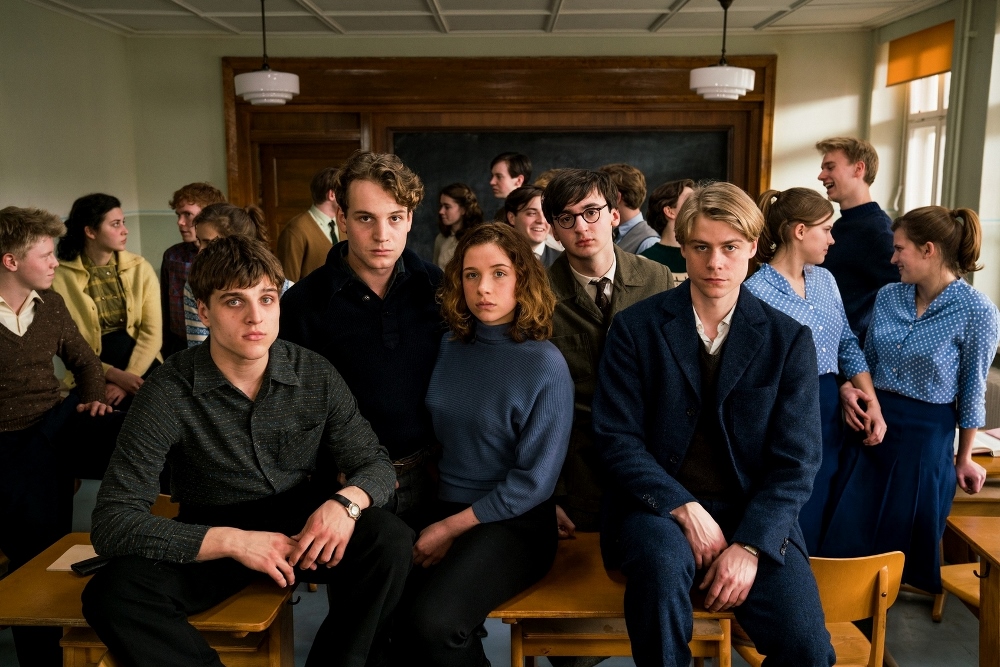
The year is 1956 and two high school seniors go to see Liane, Jungle Goddess, directed by Eduard Von Borsody at a movie theatre in West Berlin. Considering that Theo (Leonard Scheicher) and Kurt (Tom Gramenz) are from Stalinstadt in East Germany, where this kind of film would never be shown, it’s a notch above typical teenage limit testing. Yet the Berlin Wall is still several years in the future, so passage from East to West Berlin, although far from encouraged or trivial, is possible. As it turns out, the boy’s excitement over Marion Michael in a bikini pales in comparison to their reaction to the newsreel shown before the film, with information about the Hungarian Revolution from a Western perspective.
The Silent Revolution, Lars Kraume’s historical drama, is a striking, thought-provoking film that reflects the charged political atmosphere of post-war Germany. Although the events depicted took place in the 1950s, the film’s perspective on issues of freedom of expression and individual choice is critically relevant for our times, offering through its distance in time and culture, an opportunity to question our own choices, culture and government.
Back in school, excited by the news of the protests in Hungary, and affected by the deaths of protesters, including reports that Communist soccer hero Ferenc Puskas was among those killed, the students decide to show their solidarity with a moment of silence in memory of the fallen. This act sets off an investigation that begins within the confines of the school, and soon takes on much larger political proportions with the threat of serious consequences. The feature film is based on true events, as depicted in the autobiographical book by Dietrich Garstka. The shadow of WWII and Nazi Germany looms large, and is the source of many conflicts and tensions, affecting decision-making. For example, the official reason for the boy’s jaunt to the West is to lay flowers on the grave of Kurt’s grandfather, a former SS officer. It is an act that is tolerated, after all, it’s family, yet at the same time, the grandfather’s Nazi affiliation is a source of shame and in the East German political regime, any association with the man and his memory has potential to make the entire family suspect. All the more so, given that Kurt’s father is a City Councilman.
The dynamics of 1950s East German internal politics are seen from the very intimate perspective of teenagers; their relationships with family and friends, as well as the individual search to define one’s identity. Actions that might be shrugged off as youthful pranks or expressions of individuality in present times and democratic governments, takes on serious proportions in a regime in which the radio station one listens to can be considered an act of treason. Leonard Scheicher is particularly affecting as Theo, a happy-go-lucky guy whose natural tendency is to go with the flow, and suddenly finds himself in a situation that demands making difficult decisions and taking a stand.
The Silent Revolution is distributed in Israel by Nachshon Films and opens December 27, 2018.
The Silent Revolution
Germany, 2018, 111 min, German with Hebrew and English subtitles
Directed by Lars Kraume; Screenplay: Lars Kraume, based on a book by Dietrich Garstka; Cinematography: Jens Harant; Editor: Barbara Gies; Sound design: Stefan Soltau; Music: Christoph M. Kaiser, Julian Maas; Cast: Leonard Scheicher, Tom Gramenz, Lena Klenke, Isaiah Michalski, Jonas Dassler, Ronald Zehrfeld, Florian Lukas, Jördis Triebel, Michael Gwisdek, Burghart Klaußner





